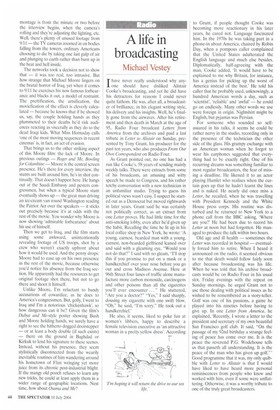A life in broadcasting
Michael Vestey
T have never really understood why any1. one should have disliked Alistair Cooke's broadcasting, and yet he did have his detractors for reasons I could never quite fathom. He was, after all, a broadcaster of brilliance, in his elegant writing style, his delivery and his insights. Well, he's finally gone from the airwaves. After his retirement and then death in March at the age of 95, Radio Four broadcast Letters from America from the archives and paid a last tribute in Letter to Alistair on Sunday, presented by Tony Grant, his producer for the past ten years, who also produces From Our Own Correspondent on Radio Four.
As Grant pointed out, no one has had a run like Cooke's, 58 years of sending mainly weekly talks. There were extracts from some of his broadcasts, an amusing and witty speech he made to Congress, and his rather tetchy conversation with a new technician in an unfamiliar studio. Trying to guess his political views wasn't easy. I suspect he started out as a Democrat but moved rightwards in later years. Grant said he was certainly not politically correct, as an extract from one Letter proves. He had little time for the anti-smoking lobby, even after he'd given up the habit. Recalling the time he lit up in his local coffee shop in New York, he wrote: 'A young, earnest, bearded man with a young, earnest, non-bearded girlfriend leaned over and said with a gleaming eye, "Would you not do that?" I said with no gleam, "I'll stop this if you promise to put on a mask or a handkerchief over your nose before you go out and cross Madison Avenue. Here at 96th Street four lanes of traffic alone manufacture more carbon monoxide, carcinogens and other poisons than all the cigarettes you'll ever encounter. ... " He stuttered, "Are you a doctor?" "Yes," I said sharply, dousing my cigarette with one swift blow. "Oh," he said, "I'm sorry." He took out a handkerchief.'
He also, it seems, liked to poke fun at women's libbers, happy to describe a female television executive as 'an attractive woman in a pretty yellow dress'. According to Grant, if people thought Cooke was becoming more reactionary in his later years, he cared not. Language fascinated him. In the 1970s he was taking part in a phone-in about America, chaired by Robin Day, when a pompous caller complained that the United States adulterated the English language and much else besides. Diplomatically, half-agreeing with the man, Cooke added, 'It would have to be explained to me why Britain, for instance, has a genius for picking up the worst of America instead of the best.' He told his caller that he probably used, unknowingly, a hundred American words a day, such as 'scientist', 'reliable' and 'awful' — he could go on endlessly. Many other words we use were foreign in origin. Nightshirt might be English, but pyjamas was Persian.
For someone who sounded so selfassured in his talks, it seems he could be rather nervy in the studio, recording only in the presence of the technician the other side of the glass. His grumpy exchange with an American woman when he forgot to wear his earphones suggested that everything had to be exactly right. One of his recurring dreams was something familiar to most regular broadcasters, the fear of missing a deadline. He likened it to an actor playing Hamlet who realises when the curtain goes up that he hadn't learnt the lines and is naked. He nearly did once miss a Letter, he recalled, when he was travelling with President Kennedy and the White House press corps. His routine was disturbed and he returned to New York to a phone call from the BBC asking, 'Where are you?' He had been due to record his Letter at noon but had forgotten. He managed to produce the talk within two hours.
Old age and ill health — sometimes the Letter was recorded in hospital — eventually forced him to retire. When I heard it announced on the radio, it seemed obvious to me that death would follow fairly soon after because broadcasting was his life. When he was told that his archive broadcasts would be on Radio Four in his usual slot, Friday evenings with the repeat on Sunday mornings, he urged Grant not to use those dealing with political issues as he wished to be remembered as a story-teller. Golf was one of his passions, a game he played into his nineties before having to give up. In one Letter from America, he explained, 'Recently, I wrote a letter to the president and secretary of my own beautiful San Francisco golf club. It said, "On the passage of my 92nd birthday a strange feeling of peace has come over me. It is the peace the reverend P.G. Wodehouse tells us that passeth all understanding. It is the peace of the man who has given up golf." Good programme that it was, my only quibble with Letter to Alistair is that I would have liked to have heard more personal reminiscences from people who knew and worked with him, even if some were unflattering. Otherwise, it was a worthy tribute to one of the truly great broadcasters.


























































 Previous page
Previous page